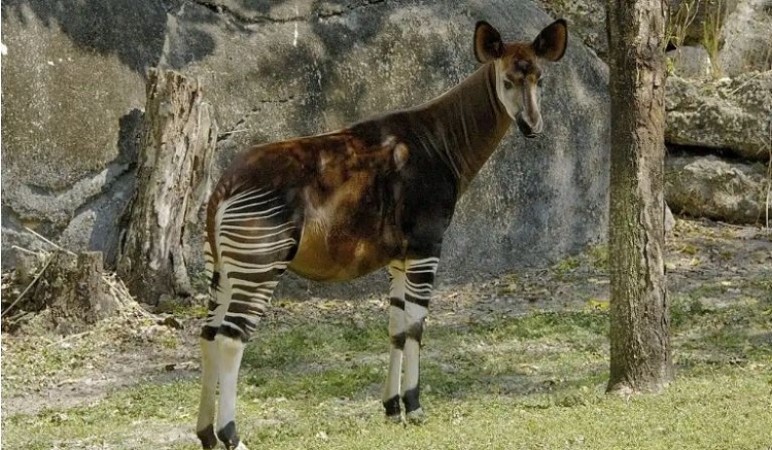
The Okapi (Okapia johnstoni), often referred to as the “forest giraffe” or the “zebra giraffe,” is a species that combines the grace of a gazelle with the allure of a zebra, a fascinating creature that seems to have been plucked straight out of a storybook. Celebrated on October 18th each year, World Okapi Day is a time to raise awareness about this remarkable and endangered species, learn about its habitat, and understand the importance of conservation efforts to protect it. In this article, we delve into the world of the Okapi, exploring what it is, why World Okapi Day is celebrated, and the urgent need to safeguard this elusive beauty of the forest.
What is an Okapi?
The Okapi, native to the dense rainforests of the Democratic Republic of the Congo in Central Africa, is a truly unique creature. It belongs to the giraffe family but is much smaller in stature, standing at around 5 to 6 feet tall. What makes the Okapi so distinct is its striking appearance. Its coat is dark reddish-brown, adorned with horizontal white stripes on its hind legs, reminiscent of a zebra's markings. These stripes serve a purpose in the wild, as they help the Okapi blend into its forest habitat, making it challenging for predators to spot.
Okapis have long, prehensile tongues that can reach up to 18 inches, allowing them to strip leaves from trees and shrubs. Their large, expressive eyes are perfectly adapted to their forest environment, helping them navigate the dimly lit understory. Despite their rather gentle and shy nature, Okapis are known for their agility and can run swiftly when threatened.
Why Celebrate World Okapi Day?
World Okapi Day serves several important purposes:
Raise Awareness: The primary aim of World Okapi Day is to raise awareness about this endangered species. Many people worldwide are still unaware of the existence of Okapis and the threats they face. By celebrating this day, conservationists and organizations can shed light on the beauty and uniqueness of the Okapi, inspiring people to take an interest in its conservation.
Highlight Conservation Efforts: World Okapi Day is a platform to showcase the ongoing conservation efforts aimed at protecting these animals. With habitat loss, poaching, and political instability threatening their existence, conservation initiatives are essential for the Okapi's survival.
Education: The day is an opportunity to educate the public, especially the younger generation, about the importance of biodiversity and the Okapi's role in the ecosystem. By understanding the Okapi's significance, people can better appreciate the value of preserving it and its habitat.
Fundraising: Many organizations use World Okapi Day to raise funds for conservation projects. Donations collected on this day often go toward habitat protection, anti-poaching efforts, and research.
Advocate for Protection: World Okapi Day provides a platform to advocate for the protection of the Okapi's habitat and stricter measures against poaching. By drawing attention to these issues, it is hoped that governments and international bodies will take more decisive actions to safeguard the species.
The Urgent Need for Conservation
The Okapi, though a fascinating and unique animal, faces numerous threats to its survival. The primary threats include:
Habitat Loss: Deforestation and human encroachment on Okapi habitat due to logging, mining, and agricultural expansion are leading to a loss of vital rainforest territory for these creatures.
Poaching: Okapis are hunted for their meat and skin, and young Okapis are sometimes captured for the illegal pet trade. The ongoing civil unrest in the Democratic Republic of the Congo makes it challenging to enforce anti-poaching laws effectively.
Political Instability: The political instability in the Okapi's native range makes conservation efforts difficult. Effective protection of the species requires a stable political environment that can enforce anti-poaching laws and safeguard their habitat.
Climate Change: Climate change poses a long-term threat to Okapi habitat. Shifts in temperature and precipitation patterns can impact the rainforests they call home.
World Okapi Day seeks to address these challenges by drawing attention to the Okapi's plight and encouraging support for their conservation. Conservation organizations, governments, and concerned individuals work together to protect these magnificent creatures and their unique ecosystem.
World Okapi Day is an occasion to celebrate the beauty and uniqueness of the Okapi while highlighting the urgent need for conservation. It serves as a reminder that this fascinating creature, often referred to as the "forest giraffe" or "zebra giraffe," is under threat, and its survival depends on our collective efforts to protect its habitat and combat poaching. By educating the public and advocating for the Okapi's preservation, we can hope to ensure that future generations can still marvel at the grace and allure of this elusive forest gem.
Anti-Slavery Day,18 October: Raising Awareness and Fighting Modern Slavery